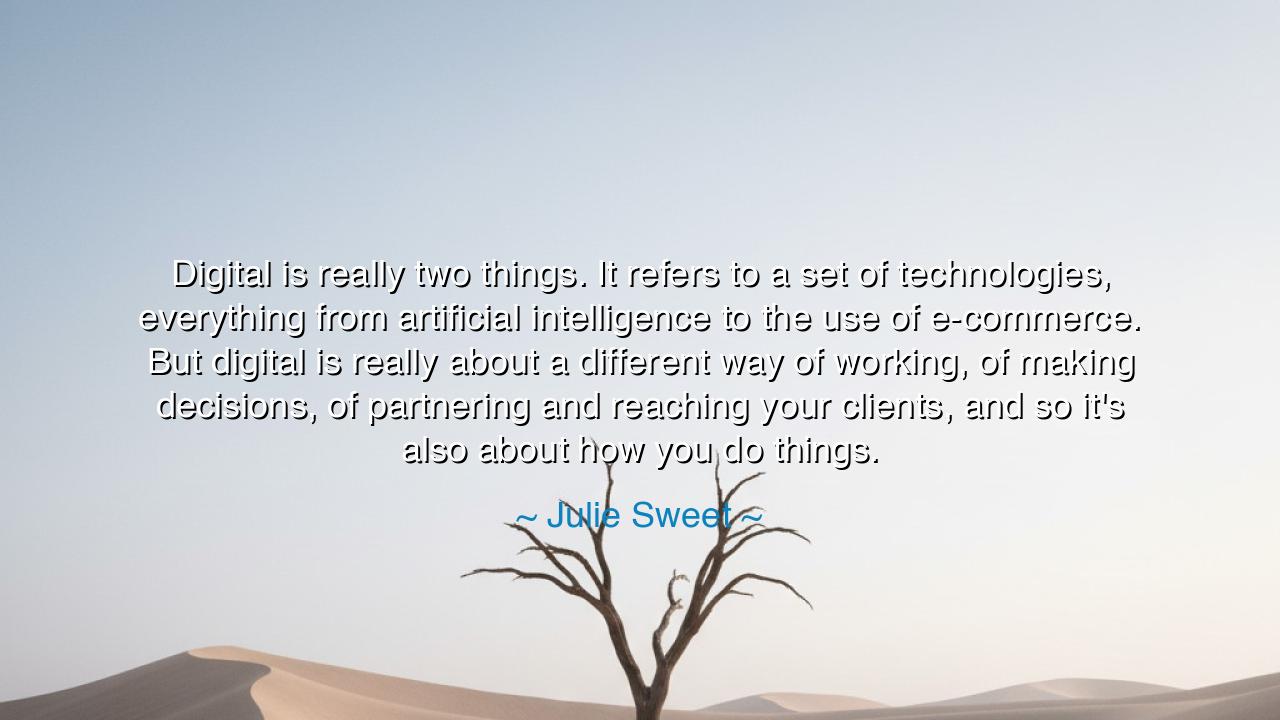
Digital is really two things. It refers to a set of technologies
Digital is really two things. It refers to a set of technologies, everything from artificial intelligence to the use of e-commerce. But digital is really about a different way of working, of making decisions, of partnering and reaching your clients, and so it's also about how you do things.






The Spirit of the Digital Age
In the words of Julie Sweet, leader and visionary of the modern age, there lies a truth both practical and profound: “Digital is really two things. It refers to a set of technologies, everything from artificial intelligence to the use of e-commerce. But digital is really about a different way of working, of making decisions, of partnering and reaching your clients, and so it’s also about how you do things.” Within this declaration is not merely an observation of progress, but a revelation about transformation—about the union of tool and spirit, of innovation and intent.
The origin of this wisdom arises from Sweet’s role as a leader of Accenture, a global force in the world of technology and consulting. She has stood at the frontier where humanity meets machine, where the old ways of labor and thought give way to new forms of intelligence and collaboration. Her words are not those of a technologist alone, but of a philosopher of change. She understands that the rise of the digital world is not simply the arrival of new devices or codes—it is the reshaping of the human endeavor itself. For what she calls “digital” is not only a collection of systems, but a mindset, a new way of perceiving and acting within the world.
To the unwise, the digital revolution may seem like a storm of inventions—artificial intelligence, cloud computing, e-commerce, automation, and more. They see the surface: the algorithms, the machines, the speed. But Julie Sweet reminds us that beneath these tools lies something deeper—the birth of a new way of being. The technologies are the instruments, but the music they create depends upon the hands that wield them. True mastery of the digital age does not come from owning more tools, but from changing the way we think, connect, and decide.
The ancients knew a similar truth when they learned to master the first tools of civilization. When early humans harnessed fire, it was not merely for warmth—it was for community. Around the flame they gathered, told stories, planned hunts, and built trust. Likewise, when they carved stone into the first wheel, they did not simply create motion—they created exchange, connection, and journey. Each tool changed not only what they could do, but who they were. So too in our age: the tools of the digital world—AI, data, connectivity—are not ends in themselves. They are the fire and the wheel of the modern era, meant to elevate our collaboration, deepen our insight, and awaken new ways of seeing.
Consider the story of Steve Jobs, whose genius lay not only in creating technology, but in reshaping how people related to it. The iPhone was not merely a device; it was a revolution in human interaction—a blending of art, design, and digital intelligence. It changed the rhythm of communication, commerce, and creativity itself. This is the essence of Sweet’s teaching: that digital is not the invention alone, but the experience it enables, the connections it strengthens, and the decisions it empowers.
To live and lead in the digital era, then, is to understand that change is not only external, but internal. A company, a team, or a person may possess the finest technologies and still remain bound by the old ways of thinking—rigid hierarchies, fear of failure, slow movement. But the truly digital mind is agile, collaborative, and courageous. It learns swiftly, decides boldly, and acts in unity. This is the different way of working that Julie Sweet speaks of: a culture where innovation flows like water, and where partnership replaces pride.
Let this teaching, therefore, be carried forward as a guiding star in the new age: technology is not your master—it is your mirror. It reflects the strength, the creativity, and the wisdom of the one who wields it. Do not fear the machines, nor worship them; rather, seek to integrate them with human purpose. Let every decision, every partnership, every action be guided not by the speed of technology, but by the depth of understanding. Use the tools of this age to build not only efficiency, but empathy; not only wealth, but wisdom.
For when humanity learns to unite digital intelligence with the human spirit, we will not merely create faster systems—we will create a better world. And in that union, as Julie Sweet foresaw, lies the true meaning of the digital era: not the triumph of the machine, but the awakening of mankind to a higher way of doing, thinking, and being.






AAdministratorAdministrator
Welcome, honored guests. Please leave a comment, we will respond soon